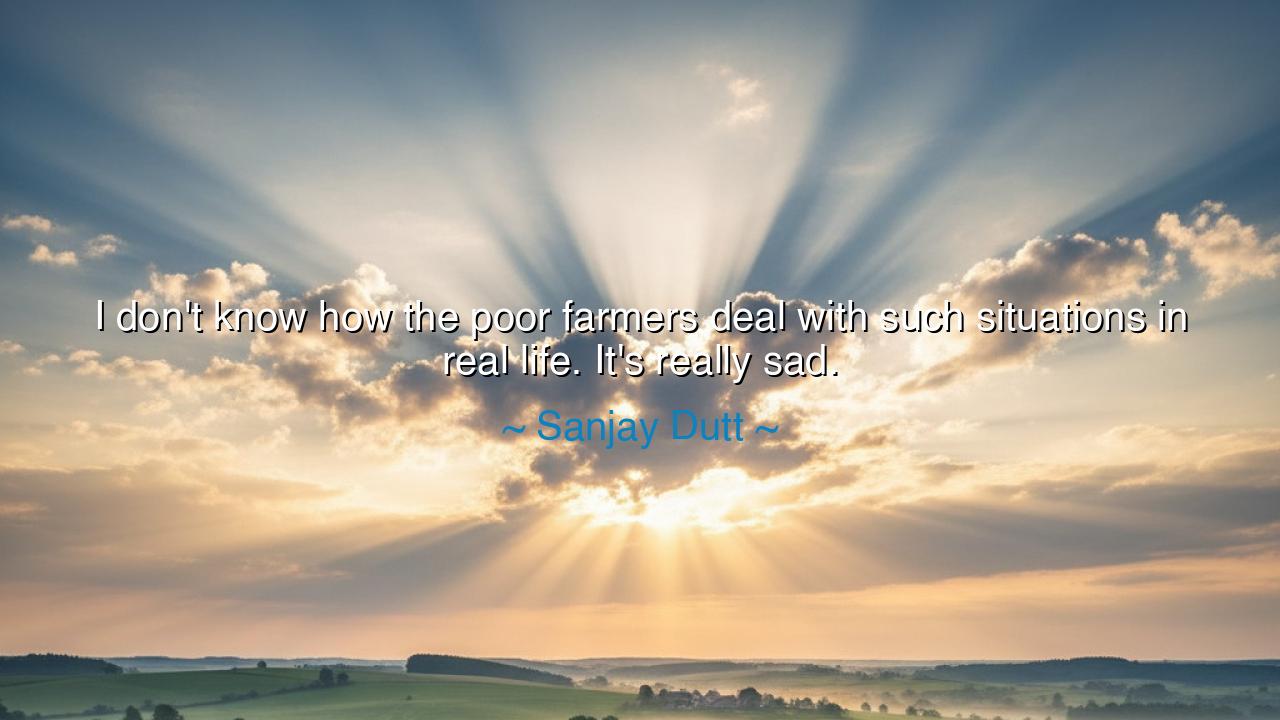
I don't know how the poor farmers deal with such situations in
I don't know how the poor farmers deal with such situations in real life. It's really sad.






When Sanjay Dutt said, “I don’t know how the poor farmers deal with such situations in real life. It’s really sad,” he spoke with the voice of compassion and bewilderment at the harsh realities of human existence. Dutt, a renowned actor of contemporary India, reflects here on the profound struggles faced by those whose labor sustains society yet whose lives are often precarious and uncertain. In these words lies a timeless truth: the hardships of the humble and the marginalized evoke both sorrow and awe, for their endurance is a testament to human resilience in the face of relentless adversity.
The ancients understood this suffering well. Hesiod, in his Works and Days, describes the life of the farmer as one of unending toil, governed by the whims of nature and the merciless cycles of the seasons. The Greek poets and philosophers recognized that labor is noble, yet often accompanied by hardship and sorrow. Dutt’s observation echoes this wisdom: those who work the soil, who feed the community, face trials that exceed the imagination of those who reap the benefits of their labor. The sadness he notes is the universal sorrow that attends injustice and inequity across time.
Dutt’s reflection is also a meditation on empathy. He acknowledges his own distance from the lived reality of poverty, expressing a sense of helplessness and admiration. This humility is itself a moral lesson: to recognize suffering we do not endure is the first step toward understanding and ethical action. The awareness that life can be harsh for the vulnerable, that survival often demands courage beyond measure, connects us to a shared human duty — to act with compassion and justice wherever possible.
History offers countless illustrations of such endurance. Consider the Irish tenant farmers of the 19th century, who lived under oppressive landlords, worked tirelessly on their land, and yet faced famine and eviction. Their resilience in the face of devastating hardship mirrors the plight Dutt describes. Despite hunger, disease, and social marginalization, these farmers continued their work and maintained their communities. Their lives remind us that courage is often quiet and uncelebrated, yet no less heroic for being ordinary.
Dutt’s words also highlight the role of societal structures in amplifying or alleviating suffering. Farmers and laborers are at the mercy of forces beyond their control: climate, markets, politics, and wealth distribution. Their endurance is a testament not only to personal courage but to the harshness of systemic inequities. The sadness he notes is compounded by the awareness that these struggles are often preventable, that injustice persists when society fails to protect its most vulnerable members.
Even in modern history, the stories of farmers and laborers continue to resonate. In the United States during the Dust Bowl of the 1930s, thousands of farming families faced crop failure, economic collapse, and forced migration. Like the farmers Dutt references, they endured hardship with courage, improvisation, and a tenacity born of necessity. Their suffering became a mirror reflecting both human resilience and the tragic consequences of neglect, echoing the sadness Dutt feels upon witnessing similar struggles today.
The lesson from Dutt’s reflection is clear: empathy must be accompanied by awareness and action. Witnessing the struggles of others is not enough; understanding, advocacy, and support are necessary to ease the burden of those facing hardship. The farmer’s endurance teaches us both humility and responsibility — humility in recognizing our privilege, and responsibility in using our resources and influence to alleviate suffering wherever possible.
So, O listener, carry Dutt’s insight into your life: cultivate empathy for those whose struggles are distant from your own experience. Reflect on the courage of the humble, the endurance of the marginalized, and let their resilience inspire both gratitude and action. In recognizing the sadness of human suffering, we are called to greater compassion, justice, and service — for it is through such deeds that society nurtures both its own well-being and the dignity of those who toil unseen.






AAdministratorAdministrator
Welcome, honored guests. Please leave a comment, we will respond soon